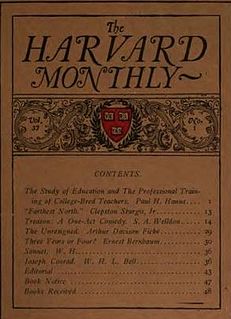Notes
This article includes a list of references, related reading or external links, but its sources remain unclear because it lacks inline citations .(July 2013) (Learn how and when to remove this template message) |
William Belmont Parker (born Hasbury, England, 19 September 1871; died 1934) was a United States editor.
He came to the United States in early youth, graduated from Harvard in 1897, and in 1898-1902 was assistant editor of the Atlantic Monthly . He was literary adviser to Houghton, Mifflin and Company, New York City, in 1902-04; instructor in English at Harvard in 1904-05 and lecturer in that subject at Columbia in 1905-08.
He was advisory editor of the Associated Sunday Magazines in 1906-08, and literary editor of The World's Work in 1908. He was editor and literary adviser to the Baker and Taylor Company in 1909-12, and literary adviser to the Century Company in 1912. He was business manager of the Churchman in 1912-14. Beginning in 1914, he was an editor with S. Pearson and Son.
He edited:
He wrote:
This article includes a list of references, related reading or external links, but its sources remain unclear because it lacks inline citations .(July 2013) (Learn how and when to remove this template message) |

Andrew Lang was a Scottish poet, novelist, literary critic, and contributor to the field of anthropology. He is best known as a collector of folk and fairy tales. The Andrew Lang lectures at the University of St Andrews are named after him.

John Kendrick Bangs was an American author, humorist, editor and satirist.

Sir William Robertson Nicoll CH LLD was a Scottish Free Church minister, journalist, editor, and man of letters.

Edward Rowland Sill was an American poet and educator.
Ralph Barton Perry was an American philosopher. He was a strident moral idealist who stated in 1909 that, to him, idealism meant "to interpret life consistently with ethical, scientific, and metaphysical truth." Perry's viewpoints on religion stressed the notion that religious thinking possessed legitimacy should it exist within a framework accepting of human reason and social progress.

Yonejirō Noguchi was an influential Japanese writer of poetry, fiction, essays and literary criticism in both English and Japanese. He is known in the west as Yone Noguchi. He was the father of noted sculptor Isamu Noguchi.
The Victoria Medal of Honour (VMH) is awarded to British horticulturists resident in the United Kingdom whom the Royal Horticultural Society Council considers deserving of special honour by the Society.

William Fogg Osgood was an American mathematician.
Nathan Haskell Dole was an American editor, translator, and author. He attended Phillips Academy, Andover, and graduated from Harvard University in 1874. He was a writer and journalist in Philadelphia, New York, and Boston. He translated many works of Leo Tolstoy, and books of other Russians; novels of the Spaniard Armando Palacio Valdés (1886–90); a variety of works from the French and Italian.

Edward James Livernash, subsequently Edward James de Nivernais, was a U.S. Representative representing the fourth congressional district of California. Late in life Livernash adopted the French form of the family name, de Nivernais, by decree of court.
This page contains a list in alphabetical order of cricketers who have played for Hampshire County Cricket Club in top-class matches since it was founded in 1863. The county club is classified as an important team by substantial sources from its first match in 1864 until 1885; classified as an official first-class team from 1895 by Marylebone Cricket Club (MCC) and the County Championship clubs; classified as a List A team since the beginning of limited overs cricket in 1963; and classified as a first-class Twenty20 team since the inauguration of the Twenty20 Cup in 2003.

The Harvard Monthly was a literary magazine of Harvard University in Cambridge, Massachusetts, beginning October 1885 until suspending publication following the Spring 1917 issue.
The England–Scotland Amateur Match was an annual men's amateur golf competition between teams representing England and Scotland. It was played from 1902 to 1931, although the match lapsed between 1913 and 1921. The match continued after 1931 but as part of the Men's Home Internationals in which Ireland and Wales also competed. Until 1931 it was played in connection with the Amateur Championship, on the Saturday either before or after the championship.